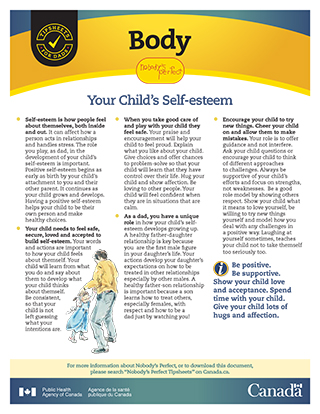Body: Your Child’s Self-esteem

Download the alternative format
(PDF format, 562 KB, 2 pages)
Organization: Public Health Agency of Canada
Self-esteem is how people feel about themselves, both inside and out. It can affect how a person acts in relationships and handles stress. The role you play, as dad, in the development of your child’s self-esteem is important. Positive self-esteem begins as early as birth by your child’s attachment to you and their other parent. It continues as your child grows and develops. Having a positive self-esteem helps your child to be their own person and make healthy choices.
Your child needs to feel safe, secure, loved and accepted to build self-esteem. Your words and actions are important to how your child feels about themself. Your child will learn from what you do and say about them to develop what your child thinks about themself. Be consistent, so that your child is not left guessing what your intentions are.
When you take good care of and play with your child they feel safe. Your praise and encouragement will help your child to feel proud. Explain what you like about your child. Give choices and offer chances to problem-solve so that your child will learn that they have control over their life. Hug your child and show affection. Be loving to other people. Your child will feel confident when they are in situations that are calm.
As a dad, you have a unique role in how your child’s self-esteem develops growing up. A healthy father-daughter relationship is key because you are the first male figure in your daughter’s life. Your actions develop your daughter’s expectations on how to be treated in other relationships especially by other males. A healthy father-son relationship is important because a son learns how to treat others, especially females, with respect and how to be a dad just by watching you!
Encourage your child to try new things. Cheer your child on and allow them to make mistakes. Your role is to offer guidance and not interfere. Ask your child questions or encourage your child to think of different approaches to challenges. Always be supportive of your child’s efforts and focus on strengths, not weaknesses. Be a good role model by showing others respect. Show your child what it means to love yourself, be willing to try new things yourself, and model how you deal with any challenges, in a positive way. Laughing at yourself sometimes, teaches your child not to take themself too seriously too.
Be positive. Be supportive. Show your child love and acceptance. Spend time with your child. Give your child lots of hugs and affection.
Fun & Easy Activities
Reaching for something and getting it builds your baby’s inner self esteem.
Encourage your baby to reach for toys, such as a teething ring or soft animal, by placing them on the floor on a blanket with the toy just out of reach. You can also put different coloured socks on your baby’s feet and encourage your baby them to pull them off. Celebrate each accomplishment.
Initiate games that challenge your toddler.
Your toddler feels good, which builds self-esteem, when they can do it. Build tall towers with blocks together. Your child can knock it down and you both can build it up over and over again. Read a story out loud and encourage your toddler make the noises of animals when you point to the picture. Give your toddler a cloth so that they can help you clean the table. Praise your child for their efforts.
Helping around the house teaches responsibility and increases your preschooler’s confidence.
Pick a chore that your child can do often like watering the plants or feeding the dog. Compliment your child for consistent efforts such as “The plants look healthy because you have been watering them” or “Thank you for helping to put away the groceries. It takes less time when you help me!”
Problem-solving is great for building self-esteem in your older children.
Give your child a challenge and let them think of ways to create solutions. For example, give your child several items from the recycling bin such as milk jugs, cans, cardboard, water bottles, and toilet paper rolls. Provide tape, glue and string. Challenge your child to build a boat and then test the boat in a puddle or bath tub. If it floats, give high fives and hugs and celebrate your child’s accomplishment. If it does not, talk about ways to improve the design and encourage your child to try it again.
The Public Health Agency of Canada gratefully acknowledges the collaboration and expertise of Dad Central Canada (www.dadcentral.ca) and their national network in the development of the Nobody’s Perfect tipsheets for dads.